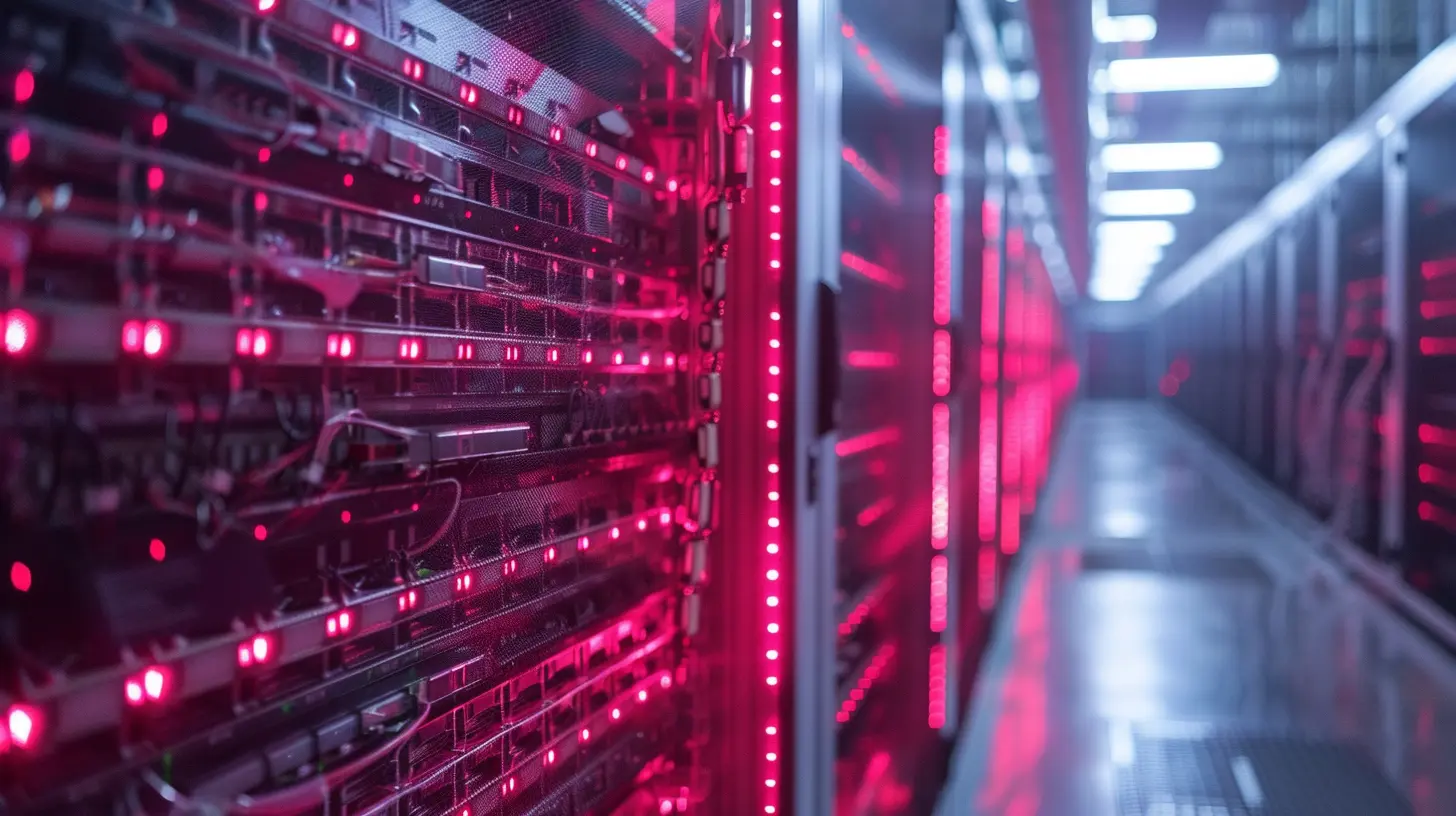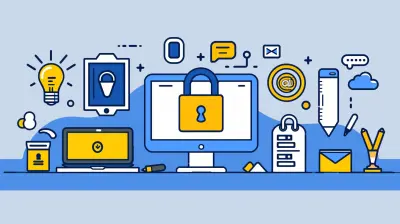How Blockchain Technology Is Enhancing Data Center Security
21 August 2025
The digital age thrives on data, and data centers are the backbone of this vast, interconnected world. But here’s the catch—these hubs of information are prime targets for cyberattacks. With security breaches costing companies millions and destroying reputations overnight, the need for rock-solid protection is more critical than ever. Enter blockchain technology, a game-changer in securing data centers against cyber threats.
In this article, we’ll break down how blockchain is revolutionizing data center security, eliminating vulnerabilities, and creating an unhackable fortress of information. 
Why Traditional Data Centers Are Vulnerable
Let’s be real—data centers, despite their advanced infrastructure, are still vulnerable to cyberattacks. The problem? Centralization. Traditional data centers rely on centralized servers, making them juicy targets for hackers. Once someone breaches the system, they gain access to an entire network of sensitive data.Here are the key vulnerabilities of traditional data centers:
1. Single Point of Failure
Most data centers function on a centralized model, meaning if hackers breach one point, they can compromise everything. It's like having a single key that unlocks every door in your house—once it’s stolen, nothing is safe.2. Insider Threats
Not all threats come from the outside. Employees with access to sensitive information can either intentionally or accidentally leak data. Consider the infamous Edward Snowden case—an insider revealing classified information without breaking a sweat.3. Data Tampering and Corruption
Cybercriminals don’t always steal data; sometimes, they alter it to create chaos or push an agenda. And with centralized storage, recovering clean versions of the data is like finding a needle in a haystack.4. DDoS Attacks
Ever heard of Distributed Denial-of-Service (DDoS) attacks? They overload a data center with fake traffic, causing outages and serious financial losses. Traditional security measures struggle to fend off these high-volume cyber onslaughts.5. Unauthorized Access
Weak authentication methods make data centers vulnerable to unauthorized access. If credentials are compromised, intruders can wreak havoc without detection.Clearly, the current system needs an upgrade. That’s where blockchain steps in, offering an unbreakable and decentralized alternative. 
How Blockchain Enhances Data Center Security
Blockchain isn’t just about Bitcoin and cryptocurrencies—it’s a game-changing security framework. Let’s dive into what makes it perfect for data centers.1. Decentralization: No Single Point of Failure
Unlike traditional data centers, where data is stored in one place, blockchain operates on a distributed ledger. This means data is spread across multiple nodes (computers), making it virtually impossible for hackers to take down the entire system.Even if one node is compromised, the rest of the network remains intact and secure. Think of it like storing gold in a thousand vaults instead of just one—good luck stealing all of it!
2. Immutable Data: No Room for Tampering
Blockchain’s immutable ledger ensures that once data is recorded, it cannot be altered or deleted. Every piece of information is time-stamped, cryptographically sealed, and linked to the previous entry.If someone tries to tamper with a record, the blockchain immediately flags the discrepancy. It's like writing in permanent ink—there's no way to erase the past without leaving traces behind.
3. Eliminating Insider Threats
With blockchain, everyone in the network has access to the same version of the truth. There’s no single authority controlling data, which means even insiders with high-level access can’t manipulate records without being detected.Plus, smart contracts can automate security protocols, ensuring that employees only access the data they absolutely need—no more, no less.
4. Enhanced Authentication and Access Control
Say goodbye to weak passwords and centralized authentication systems! Blockchain introduces decentralized identity management, where access is granted based on cryptographic keys instead of traditional usernames and passwords.This means no more stolen credentials, no more phishing attacks, and no more unauthorized access. Only the rightful owner can decrypt and access their information.
5. DDoS Attack Prevention
By distributing data across multiple nodes, blockchain eliminates the single point of entry that most hackers exploit for launching DDoS attacks. Even if a portion of the network is targeted, the rest of the system remains fully operational.Think of it as trying to knock over a house of cards, except each card is glued down tight. Good luck bringing the whole thing down!
6. Automated Security Monitoring with Smart Contracts
Blockchain’s smart contracts can automate security monitoring and enforce protocols in real-time. These contracts can instantly detect suspicious activities, lock compromised accounts, and alert security teams—without human intervention.No delays. No human errors. Just instant, automated protection.
7. Data Encryption Like Never Before
Traditional encryption methods are good, but blockchain takes things to another level. Thanks to cryptographic hashing, data is stored in a way that even if hackers intercept it, they won’t be able to make sense of it.Think of it as storing a secret message inside a rigid, unbreakable lockbox—even if someone gets their hands on it, they’ll never get the key. 
Industries Already Using Blockchain for Security
This isn’t just theoretical—many industries have already started integrating blockchain to revolutionize security.1. Financial Institutions
Banks and financial institutions use blockchain for secure transactions and fraud prevention. With every transaction verified and recorded on blockchain, financial crimes are drastically reduced.2. Healthcare
Patient records are now being stored on blockchain to prevent data breaches and ensure only authorized professionals can access sensitive health data.3. Government and Defense
Defense departments are leveraging blockchain to store classified information securely, ensuring that national security data is protected from cyber espionage.4. Supply Chain and Logistics
Blockchain is used to track and verify shipments, preventing counterfeit goods and ensuring data integrity.5. Cloud Computing and Data Centers
Big tech giants are already exploring blockchain-based cloud storage to provide unhackable, tamper-proof data hosting solutions.
Challenges of Implementing Blockchain in Data Centers
Sure, blockchain is powerful, but let’s not ignore the hurdles that come with integrating it into data center security.1. Scalability Issues
Blockchain networks require huge computing power and storage, making scalability a major challenge.2. Initial Implementation Costs
Setting up blockchain-based security isn’t cheap. Major investments in hardware and expertise are needed, which might be a roadblock for smaller organizations.3. Skill Shortage
Since blockchain is still relatively new in data security, there aren’t enough skilled professionals who can smoothly integrate it into existing IT infrastructure.4. Regulatory Uncertainty
Governments across the world are still figuring out how to regulate blockchain technology, making widespread adoption a bit tricky.Despite these challenges, the security benefits are too significant to ignore. As blockchain technology evolves, these hurdles are expected to be resolved.
Final Thoughts
Blockchain isn’t just a buzzword—it’s a revolutionary tool that’s transforming data center security. With decentralization, immutability, advanced encryption, and automated monitoring, blockchain drastically reduces the vulnerabilities of traditional data centers.Sure, challenges exist, but the potential benefits are too massive to overlook. As cyber threats continue to evolve, adopting blockchain is no longer an option—it’s a necessity for any data-driven organization that values security and integrity.
Are we looking at a future where data centers are entirely blockchain-powered? Maybe. But one thing’s for sure—the era of centralized, easily-hackable data storage is coming to an end.
all images in this post were generated using AI tools
Category:
Data CentersAuthor:

Reese McQuillan
Discussion
rate this article
1 comments
Zorion Torres
Blockchain: because traditional security just doesn't cut it!
August 29, 2025 at 3:06 AM

Reese McQuillan
Absolutely! Blockchain offers decentralized, tamper-proof solutions that significantly enhance data center security beyond traditional methods.


